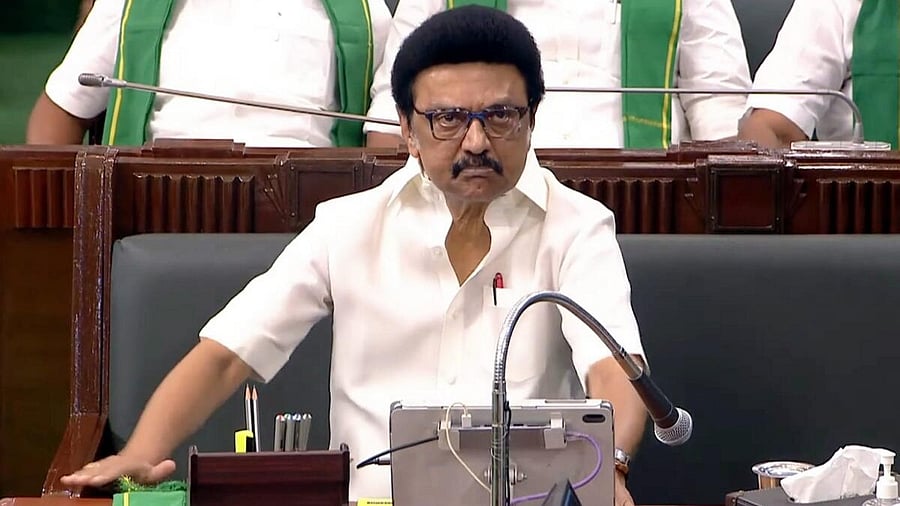
Tamil Nadu Chief Minister M K Stalin in the state Assembly.
Credit: PTI Photo
Chennai: Months after refusing to join PM Vishwakarma scheme in its present form, the Tamil Nadu government M K Stalin on Saturday launched the Kalaignar Kaivinai Thittam (KKT), a new credit-linked subsidy scheme to support artisans involved in about 25 trades. Of 24,907 applications received, as many as 8,951 beneficiaries were chosen and loans totalling Rs 170 crore have been approved by various banks.
Unveiling the scheme in Kanchipuram district, Chief Minister M K Stalin said the state government refused to join the Vishwakarma scheme as he believed it strengthened the “system of caste-based vocation" and allowed even people at the age of 18 to apply.
He said a government's duty was to bring students back to education, not to push them out of it or force them into family occupation, while talking about schemes by his dispensation to ensure that students pursue higher education after completing their plus-two.
“In contrast, the BJP government promotes hereditary trades...We have been clear from the beginning that every scheme should uphold social justice and equality. However, the Vishwakarma Scheme did not align with our principles, and felt it was openly promoting caste-based discrimination and the outdated system of hereditary trades,” Stalin said.
He said to make KTK inclusive, the government didn’t make mandatory that applicants must engage in their family's hereditary trade, allowing anyone to pursue any eligible trade, raised the minimum age limit for applicants from 18 to 35, and transfer the responsibility of verifying beneficiaries in rural areas from village panchayat presidents to village officers.
While the Union’s Vishwakarma Scheme covers only 18 trades, our Kalaignar Kaivinai Thittam includes 25 types of trades, Stalin said, adding that loans ranging from Rs 50,000 to Rs 3 lakh are provided with subsidies, unlike the Vishwakarma Scheme, which offers no subsidies.
Stalin also said the scheme was nothing but a revised form of kula kalvi thittam (caste-based vocation) which was introduced by the then Chief Minister of Madras state C Rajagopalachari. The scheme was withdrawn due to intense opposition within Rajaji’s Congress and from several parties, including the DMK.
The credit linked subsidy will help artisans set up new businesses and expand existing ones, provide skill development training with focus on upskilling and modernisation and entrepreneurship development training with focus to establish as a business entity, and enable artisans to access modern tools and facilities for their business requirements.
Carpentry, metal works, masonry, painting, glasswork, stucco works, tailoring, jewellery, hair designing and grooming, washing, ironing, and laundry, leather handicrafts, and making of boats, brooms, doll/toy, garland, fishing boats, fishnets, stone carving, and pottery are some of the trades that have been covered in the scheme.
Any artisan or craftsperson of minimum 35 years of age, with a prior relevant experience of minimum 5 years in the chosen trade will be eligible for a maximum loan assistance of Rs 3 lakh, which will be disbursed in up to two tranches, an GO issued in this regard said, adding that loans should be repaid in monthly instalments over a period of 60 months.
A credit guarantee cover of up to 90 per cent will be provided for loans sanctioned by banks under Kalaignar Kaivinai Thittam, with a sum of Rs 25 crore will be earmarked under the Tamil Nadu Credit Guarantee Scheme (TNCGS).